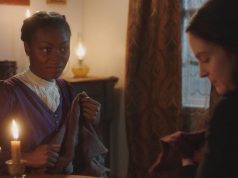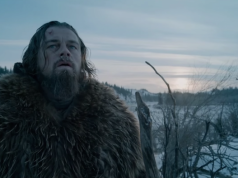The thousands of people who have bought Gerald N. Lund’s historical fiction novel “The Work and the Glory” will probably be adequately entertained by the lavish new film version. I haven’t read the book, so I can’t say whether it is as overwhelmingly average as the film is, but I think they are probably comparable. It seems unlikely that the book was brimming with vitality and intrigue and the filmmakers just chose to omit it.
This is a film that teeters dangerously on the edge of boredom. It occasionally catches its balance with bright supporting characters or compelling scenes, but then it stumbles again with mild scenes of characters having spiritual crises. It never completely tips over into tedium, though, I’ll give it that, and it’s pleasant to look at, with sumptuous period costumes and production design.
Based on the first volume in Lund’s nine-part series, it is set in the late 1820s in Palmyra, N.Y., where a young fellow named Joseph Smith (Jonathan Scarfe) has gained notoriety for his account of having had a vision of God and Jesus Christ, and the subsequent visitation of an angel who told him where to obtain gold plates on which were engraved the account that he would later translate into The Book of Mormon. Some believe Joseph’s story, but most are derisive, and some are even dangerous.
Into this setting moves the fictional Steed family, eager to take advantage of the land rush going on in western New York. They are decent, God-fearing folks, though not actively religious. They hire Joseph and his brother Hyrum (Ryan Wood) to help clear their land, and thus the Steeds become intertwined with the Smiths’ history. The mother, Mary Ann (Brenda Strong), believes Joseph; her husband Benjamin (Sam Hennings) doesn’t; the children are about evenly split.
Their oldest son, the surly and at first subtly rebellious Joshua (Eric Johnson), falls in with the wrong crowd in Palmyra, drinking, growing facial hair and speaking in an ominous whisper just like the rowdies and thieves who inhabit the local saloons. (In this movie, the more beard you have, and the more you talk like Clint Eastwood, the more evil you are.) Joshua has a crush on local girl Lydia McBride (Tiffany Dupont), but guess who also likes her? Joshua’s brother Nathan (Alexander Carroll), who is clean-shaven, speaks in normal tones, and believes in Joseph Smith, whereas Joshua and his cronies just want to steal the gold plates (which they also profess not to believe in the existence of, so I’m not really sure where they’re coming from, theologically).
At heart, the film is an extremely demure love story, focusing on Nathan and Lydia, with bits of the Joshua triangle popping up occasionally. Lydia’s parents think Joseph Smith is a fake and won’t let her have anything to do with him, which creates problems for her and the devout Nathan. That, plus the various other characters’ religious angst, accounts for a good deal of the film’s running time — which means if watching average people struggle with their personal spiritual dramas doesn’t interest you, then you’re in for a long night, my friend.
Most of the acting is fine; I just don’t think the characters are drawn well enough to make them sufficiently compelling to sustain such an introspective story. Lund had an entire book to develop the characters, and knew he had eight more volumes in which to continue it. Director Russ Holt, who adapted the screenplay, had only 108 minutes.
The most charismatic presence in the film is Jonathan Scarfe, who makes Joseph Smith as personable yet enigmatic as he is supposed to have been. He has the unenviable task of telling the incredible story of Joseph’s first vision in a way that sounds sincere rather than fantastic. Scarfe conveys this flawlessly. Even if you don’t believe Joseph Smith was a prophet, in watching Scarfe’s performance, you can see how others might have.
But in the end, it’s more an episode than a movie. It introduces a dozen or so characters, gives them some things to do, then wraps up only a few loose threads before the film’s over and we’re left waiting for the sequel. Even a movie intended as the start of a “franchise” ought to have self-contained stories, and it ought to convince us that these people are worth watching. If Volume 1 of the book series is as flat as the movie portrays it, I doubt I would ever make it to Volume 2.
(Note: One question people always have about movies like this is how “Mormon” is it? There isn’t a whole lot of doctrine, and what there is generally receives an explanation, as it’s usually new to the characters, too. But the film is intrinsically “Mormon” in that I don’t think anyone who hasn’t been a member of the LDS Church for a long time will really “get” why the characters’ spiritual angst is such a big deal. I think it is probably a film that speaks only to Mormons, if to anyone.)
C+ (1 hr., 48 min.; )





